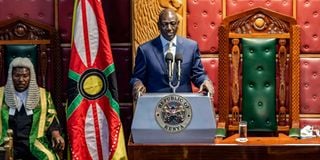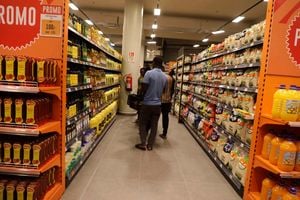
President William Ruto delivers the State of Nation address at Parliament in Nairobi on November 9, 2023.
President William Ruto used his Thursday State of the Nation Address to highlight some of his major achievements in the last two years.
The Head of State cited major milestones in bringing down the cost of basic commodities like maize flour, stabilising the shilling and declining inflation.
The President said he ascended to power when the prices of basic food commodities soared as a result of prolonged drought and declining local productivity.
“Today, I am proud to report that all macro-economic indicators point to a positive turnaround and an upward trajectory,” Dr Ruto said.
He said his administration had managed to stabilise the shilling, making it appreciate significantly from Sh162 to the dollar in February 2024, to Sh129 currently.
The President said the recovery of the shilling has since restored confidence in the country’s financial markets and significantly reduced the cost of servicing external debt.
Further, he said, inflation had declined from 9.6 percent in September 2022 to 2.7 percent in October 2024. This, he said, was the lowest rate in 17 years.
“Our foreign exchange reserves have surged by $2.4 billion to hit a record $9.5 billion, providing 4.8 months of import cover, the highest in 10 years,” he said.
He went on: “This resilience shields us from external shocks in the global economy and restores investor confidence. Interest rates are also trending downward, reducing borrowing costs and freeing up fiscal space for growth-enhancing initiatives by businesses.”
He also said that tax revenues had grown by 11.5 percent in the year to June 2024, reflecting the success of our tax base expansion measures.
Food security
In making the country food-secure, the President said his administration has since February distributed subsidised fertiliser to 6.45 million registered farmers in 45 counties.
This initiative, he said, is enabling farmers to increase their yields.
“This year we have procured and through e-vouchers distributed seven million bags of both planting and top dressing fertiliser to boost food production across the country,” he said.
“This intervention will see a projected increase in maize production to a record of 74 million 90 kg bags. We have also concluded long-term agreements with eleven suppliers of assorted fertiliser so as to make this commodity available all year round,” he added.
In the sugar sector, the President said all 17 sugar factories across the country are now operational, while four new sugar factories are under construction.
“In July alone, domestic sugar production reached 84,000 metric tonnes, surpassing the national monthly consumption average of 40,000 metric tonnes,” he said.
He said it is the first time that the country is producing enough sugar to meet local demand.
He attributed this to the provision of subsidised fertiliser for sugarcane farmers.
He said his administration was also on track to increase coffee exports from 51,000 metric tonnes to 150,000 metric tonnes by 2027.
The Head State further said that the government had raised disbursements through the Cherry Advance Fund from Sh2.7 billion to Sh6 billion. This, he said, has been complemented by an additional disbursement of Sh1.5 billion by the Commodities Fund.
Further, he said the government had released Sh3 billion to modernise the New KCC and ensure farmers are paid on time while maintaining a high price of Sh50 per litre.
“As a result, milk intake to KCC has increased from 100,000 litres to 220,000 litres a day. Other strategic interventions include the extension of duty-free imports for feed manufacturing raw materials, subsidised artificial insemination services, and the reduction of sexed semen costs from Sh7,000 to Sh2,900 through the Kenya Animal Genetic Resource Center,” he said in the address.










